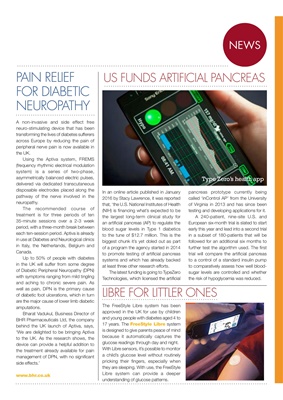
NEWS
US FUNDS ARTIFICIAL PANCREAS
In an online article published in January
2016 by Stacy Lawrence, it was reported
that, 'the U.S. National Institutes of Health
(NIH) is financing what's expected to be
the largest long-term clinical study for
an artificial pancreas (AP) to regulate the
blood sugar levels in Type 1 diabetics
to the tune of $12.7 million. This is the
biggest chunk it's yet doled out as part
of a program the agency started in 2014
to promote testing of artificial pancreas
systems and which has already backed
at least three other research efforts.
The latest funding is going to TypeZero
Technologies, which licensed the artificial
pancreas prototype currently being
called 'inControl AP' from the University
of Virginia in 2013 and has since been
testing and developing applications for it.
A 240-patient, nine-site U.S. and
European six-month trial is slated to start
early this year and lead into a second trial
in a subset of 180-patients that will be
followed for an additional six months to
further test the algorithm used. The first
trial will compare the artificial pancreas
to a control of a standard insulin pump
to comparatively assess how well bloodsugar levels are
controlled and whether
the risk of hypoglycemia was reduced.
Type Zero's health app
PAIN RELIEF
FOR DIABETIC
NEUROPATHY
A non-invasive and side effect free
neuro-stimulating device that has been
transforming the lives of diabetes sufferers
across Europe by reducing the pain of
peripheral nerve pain is now available in
the UK.
Using the Aptiva system, FREMS
(frequency rhythmic electrical modulation
system) is a series of two-phase,
asymmetrically balanced electric pulses,
delivered via dedicated transcutaneous
disposable electrodes placed along the
pathway of the nerve involved in the
neuropathy.
The recommended course of
treatment is for three periods of ten
35-minute sessions over a 2-3 week
period, with a three-month break between
each ten-session period. Aptiva is already
in use at Diabetes and Neurological clinics
in Italy, the Netherlands, Belgium and
Canada.
Up to 50% of people with diabetes
in the UK will suffer from some degree
of Diabetic Peripheral Neuropathy (DPN)
with symptoms ranging from mild tingling
and aching to chronic severe pain. As
well as pain, DPN is the primary cause
of diabetic foot ulcerations, which in turn
are the major cause of lower limb diabetic
amputations.
Bharat Vadukul, Business Director of
BHR Pharmaceuticals Ltd, the company
behind the UK launch of Aptiva, says,
'We are delighted to be bringing Aptiva
to the UK. As the research shows, the
device can provide a helpful addition to
the treatment already available for pain
management of DPN, with no significant
side effects.'
www.bhr.co.uk
The FreeStyle Libre system has been
approved in the UK for use by children
and young people with diabetes aged 4 to
17 years. The FreeStyle Libre system
is designed to give parents peace of mind
because it automatically captures the
glucose readings through day and night.
With Libre sensors, it's possible to monitor
a child's glucose level without routinely
pricking their fingers, especially when
they are sleeping. With use, the FreeStyle
Libre system can provide a deeper
understanding of glucose patterns.
LIBRE FOR LITTLER ONES